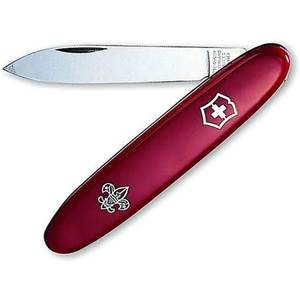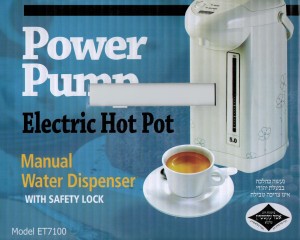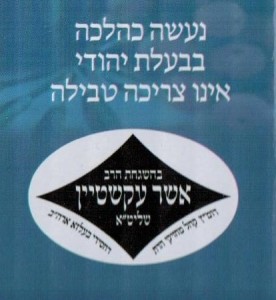~ Toveling New Food Utensils in a Mikvah ~
Sources for the Mitzvah
This is the law that G-d commanded Moshe. With regard to the gold, silver, copper, iron, tin and lead- Whatever was used over fire must be purged over fire, but it must also be purified in the waters of niddah. Anything that was not used with fire shall just be purified with water. (Bamidbar 31:21-23)
One who purchases utensils from a non-Jew: those that must be rinsed shall be rinsed, those that must be purged with boiling water shall be purged, those that must be cleansed over an open fire shall be cleansed. All require immersion in a kosher mikvah.
(Mishnah and Talmud, Avodah Zorah 75b, following the Ran’s commentary)
Other Materials
Rav Ashi stated: Glass vessels, since they can be melted down, are like metal and require immersion. (Talmud, Avodah Zorah 75b)
With regard to items made of porcelain which are glazed- The glaze is not a true glass covering, and therefore does not require tevillah. (Igros Moshe, Yoreh Deah 2:46)
It is possible that the Rabbinic legislation to immerse glass applies only to glass. Other materials, even if they can be melted down, were never included in their legislation. (Melameid Lihoil, Yoreh Deah 49)
It is probable that when the Rabbis legislated to include glass in this mitzvah it was understood that they were including all types of metals as well. This can be inferred from the words of the Talmud: Glass [requires immersion because it] is like metal. (Teshuvos V’hanhagos 1:451)
Types of Utensils
Rav Sheishes asked:If scissors are purchased from a non-Jew do they require immersion? Rav Nachman responded: The mitzvah only applies to food utensils, as they are the utensils described in the Torah. (Talmud, Avodah Zorah 75b)
Stove grates do not require immersion because the food itself never touches the grate. Grills do require immersion because the food is grilled directly on the grill.
(Bais Yosef and Shulchan Aruch Yoreh Deah 120:4)
Tevilah is only required if the utensil touches food when it is ready to be eaten. A knife used to skin an animal requires tevilah without a blessing, because that knife is used for food preparation and could be used for ready to eat food. (Chochmas Odom 73:9)
Common Questions
The ruling that disposable aluminum pans do not require immersion applies when the pan is discarded after one use. But if the person reuses it then it would be classified as a food utensil. (Teshuvos V’Hanhagos 3:259; see also Igros Moshe 3:23 and Be’er Moshe 3:55)
Some maintain that if the store owner immerses the utensils before he sells them it is not valid because the utensils were not yet obligated in immersion until they are owned by someone who will use them.
The proper procedure when giving a gift is to have someone acquire the utensil for the recipient. Once the recipient owns it, you are able to immerse it on his behalf.
(Teshuvos V’Hanhagos 1:452)
If parts of an object are immersed separately it is a valid immersion. (Rambam Keilim 26:14; see Minchas Yitzchak 3:77)
A pocketknife should be immersed with its blade open. If there are numerous blades or food utensils, then each one should be opened separately and immersed.
(Aruch Hashulchan 120:18)
How to do it
The utensil should be totally clean before immersion. A negligible amount of dirt that cannot be removed and is normally ignored does not invalidate the immersion.
(Shulchan Aruch, Yoreh Deah 120:13)
The entire utensil must be immersed in the mikvah at one time. This is unlike the koshering process in which a large utensil can be koshered in stages.
(Chochmas Odom 73:15)
A person should hold the utensil loosely in his hand, because if he holds it tightly the water will not reach all parts of the utensil. (Shulchan Aruch 120:2)
If a person immersed a vessel upside down it is invalid because the water will not touch all parts of the vessel (i.e. an air pocket will form). (Chochmas Odom 73:18)
Before the immersion [of a vessel that is definitely included in this mitzvah] a person should recite the blessing “…that He sanctified us with His commandments and commanded us regarding the immersion of a vessel / of vessels.”
(Shulchan Aruch, Yoreh Deah 120:3)
Electric Appliances
One of the challenging considerations in modern times is that some kitchen appliances that require immersion have electrical components and might be damaged from tevilah in a  mikvah. Some authorities recommend immersing items like a toaster or hot pot (urn), and then letting the item dry out for 72 hours before using it. Interestingly, some companies have begun to produce these items as items made with Jewish ownership. This way they do not need tevila in a mikvah to ready them for use in a kosher kitchen. See adjoining picture of a hot pot (urn) certified as manufactured with Jewish ownership, and does not require tevila.
mikvah. Some authorities recommend immersing items like a toaster or hot pot (urn), and then letting the item dry out for 72 hours before using it. Interestingly, some companies have begun to produce these items as items made with Jewish ownership. This way they do not need tevila in a mikvah to ready them for use in a kosher kitchen. See adjoining picture of a hot pot (urn) certified as manufactured with Jewish ownership, and does not require tevila.

0 Comments